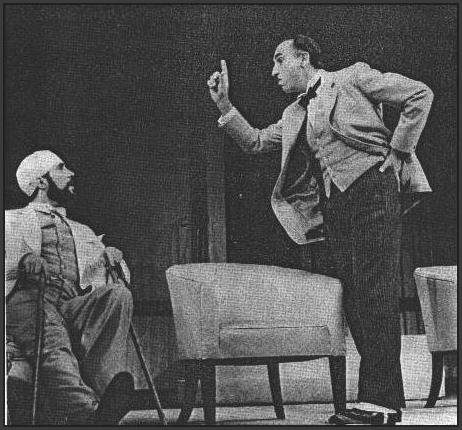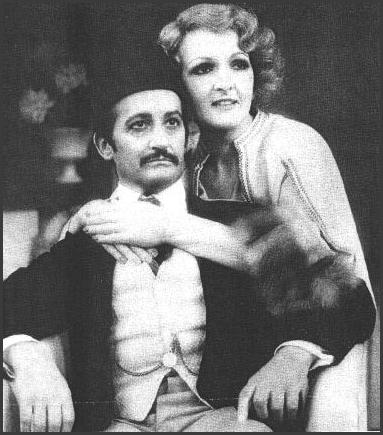












Poor Shaw
Milton Shulman, Evening Standard, December 12 1978

FEW ACTRESSES can resist the role of a glamorous, clever woman who also happens to be the richest woman in the world.
But, surprisingly enough, Bernard Shaw's The Millionairess at the Haymarket, with just such a heroine in it, has only had two major British productions since it was written in 1935.
When the part has been undertaken, it has always been by actresses with considerable pulling power at the box office. Edith Evans and Katharine Hepburn did it on the stage; while Sophia Loren tried it on the screen.
Since TV is now this country's most potent star machine, it is appropriate that one of its most recent products should try to carry the load of this Shavian trifile.
Those who just want to catch a glimpse of Penelope Keeth because of the joy she has given them as Margot in the BBC s The Good Life, will not be too concerned about the quality of the dramatic vehicle in which she is riding
Epifania uses her money ruthlessly to get what she wants. When she discovers anyone who is unimpressed by her financial resources, she either resents them or adores them
Brought up by a money-mad father, she will only consider a man for marriage who can convert �150 into �50,000 within six months.
When an Egyptian doctor challenges her to make her own living for six months, starting with only 35 pence, Epifania proves that profitmaking is simply a matter of genetics. In no time, she has a thriving business and a smart hotel.
As Epifania, Miss Keith adopts a bossy. hectoring stance which would cow most males. Because she is a natural comedienne she can make us laugh with a well-timed glower or a peremptory command like: "I will marry the doctor. Ascertain his name and make the necessary arrangements."
But the role needs more variety than she gives it. Her Epifania not only takes herself too seriously but misses the vulnerable quality that shines through her affectionate speech on marriage.
Written when he was 79, Shaw's quips are more obvious than one expects. And his scene of a London sweatshop is almost embarrassingly Victorian in its evocation of poverty.
As a farce, it is not farcical enough; and as a comment on the inequity and impossibility of' economic equality, it lacks Shaw's provocative gusto.
Charles Kay struck me as too sombre and self-satisfied as the doctor; but Nigel Hawthorne was excellent as a
fussy solicitor and Angharad Rees pertly feminine as a ninny rival.
SUPER WOMAN USES HER POWER
FRANCIS KING, Sunday Telegraph, December 17 1978
IT is a fortunate chance that has brought Shaw's "The Philanderer" and "The Millionairess" (Haymarket) to London in the same year.
Though separated by almost a half-century, each work has at its centre a woman of imperious sexuality. But whereas Julia Craven is derided and disdained, the Millionairess, Epifania - who, by her own admission, must always want something and must always get it - is obviously a character to whom Show himself, like everyone else in her orbit, was obliged to succumb.
The Egyptian doctor - played so well by Charles Kay that be effaces memories of Peter
Sellers in the film - may from time to time argue that riches are a curse and that only in the service of Allah is there justice, righteousness and happiness. But in no other of his plays, not even "Major Barbara" does Shaw reveal so nakedly his respect for ruthless efficiency and power.
Yet, however attractive to her creator, Epifania is only intermittently attractive to the reader. It takes an actress of the magnetism and skill of Edith Evans, Katharine Hepburn and now Penelope Keith to get her, and so the play,
across.
For the work of a man of nearly 80, "The Millionairess" contains a surprising number of witty lines and amusing situations; but there is also much in it that is repetitious and tedious. In this handsome production by Michael Lindsay-Hogg, the audience seemed best pleased by one of the knock about scenes in which Shaw, most cerebral of men, indulged a latent aggression: Epifania, expert in judo, assaults her lover. Ian Ogilvy and Simon Jones, husband and lover respectively, failed to exploit the comic possibilities of their parts to the full; but Nigel Hawthorne is exactly right as the cynical solicitor to everyone in general but - since she is richest - to Epifania most of all.
Rich girl
Evening Standard, December 11 1978
PENELOPE Keith has a lot to live up to as Epifania, the Millionairess of George Bernard Shaw's comedy witch opens at The Haymarket Theatre this week. It will be only the second West End production of the play, perhaps the most ill-starred of all Shaw's works.Shaw wrote the play in 1935 when he was 79. He had Edith Evans in mind for a West End run and Katharine Hepburn for a New York production.
But things went astray. It was first staged, in German, in Austria; the first English production was in Melbourne, Australia. A West End production with Evans planned for 1940 had to be cancelled because of the Blitz.
It was only In 1952, after the playwright's death that Hepburn finally stepped into the leading role in the West End at the New Theatre. The film starring Sophia Loren and Peter Sellers came later, and a recent TV production starred Maggie Smith .
Elspeth March, whom Shaw chose to play Epifania for a brief season at the Malvern Festival of 1937, stIll metaphorically bears the scars. In the original version, the lady was an accomplished boxer although in 1940 Shaw revised it to make her a judo expert.
"My husband Stewart Grainger was in the cast as the boxer husband," Miss March told me. "And he gave me some lessons in how to throw a tremendous punch."
"Epifania is a very strong lady," she added and the part is full of difficulties. But then Shaw didn't really care for women very much."
More about Money
Country life, January 11 1979

Bernard Shaw's play The Millionairess (Haymarket), which was written in 1935, shares Galsworthy's concerns with aspects of capitalism and inherited wealth, though it is such a frivolous comedy that one might well be forgiven for losing sight of the fact.
The lady of the title, Epifania Ognisanti di Parerga Fitzfassenden, is in a direct line of descent from the unfortunate Julia Craven of Shaw's second play The Philanderer (still running in repertory at the Lyttleton), even if, as Margery Morgan has remarked, it is a Julia now "purified and apotheosised".
The Millionairess is not merely a cavalierly lighthearted work on a serious theme. It is also undermined by Shaw's ambivalent fascination with capitalism, which gives Epifania a faith in, almost an ideology of, money, itself inherited from her father who told her: "Stick to your money and all the other things shall be added unto you." All this presents a problem to the leading lady and the director. Should Epifania be played straight or explicitly for comedy? In this revival, directed by Michael Lindsay-Hogg, Penelope Keith adopts the former course and plays her as a breathtakingly arrogant, imperious plutocrath who will, even literally, knock down anyone who stands in her way. Miss Keith's performance holds the stage as a fine tour de force on which the director has relied to bring animation to a somewhat static play, but it verges on a humourless monotony.
Epifania is a wealthy and destructive woman. She has lost her handsome, athletic husband (Ian Ogilvy) to a sweet but tiresome lady (Angharad Rees). She throws her Sunday lover down the stairs of an inn, and makes a dead set for an Egyptian doctor. His conditions amount to a challenge which she accepts with effrontery and cruel thoughtlessness, since it involves her in turning a tailors sweat shop in the East End into a thriving business, and the old inn into a smart hotel, without thought of the consequences to the old people who had been earning a meagre living from them. Shaw hardly seems to try to make us care about these things as he did in his plays of 40 years earlier, and it is the imposing star part that gets in the way.
However, this revival is by no means a wasted evening. There is some fine playing, notably from Nigel Hawthorne as Epifania's patient, dryly competent solicitor, and Charles Kay as the inscrutable, elusive doctor. Alan Tagg has designed a variety of sets such as we seldom see nowadays, and Miss Keith's attractive clothes are the work of Robin Fraser Paye.
Observer, January 7 1979
The heroine of Shaw's very late play The Millionairess (Haymarket) is required to be simultaneously
bossy and enchanting. Penelope Keith can be bossy and hilarious (as in 'The Norman Conquests') or vulnerable and enchanting (as in 'Donkey's Years'); the new combination is beyond her, though she manages both elements by turns and looks a treat; her giraffe height functions in the production almost as mobile sculpture.
Her colleagues mostly vary from grotesque to dull (Nigel Hawthorne performing needless prodigies of self-effacement) though Charles Kay has a pretty style as her chosen mate the Egyptian doctor whom he plays, perhaps inevitably, as Peter Sellers - Indian. (D o n a l d Pleasance once did so on television. And some movie producer saw him, and cast Mr Sellers in a film version, opposite Sophia Loren. Goodness gracious both of them.)
The play is a problem since its dialogue has sparkle far in excess of its weight. The piece races along and the audience are left wondering what it is all for. At its heart, though, is a very powerful conceit; the heroine Epifania is sexy because rich: a lineal descendant of Portia in 'The Merchant of Venice' and encumbered by much the same kind of paternal will. She is cold and challenging so is the play.
